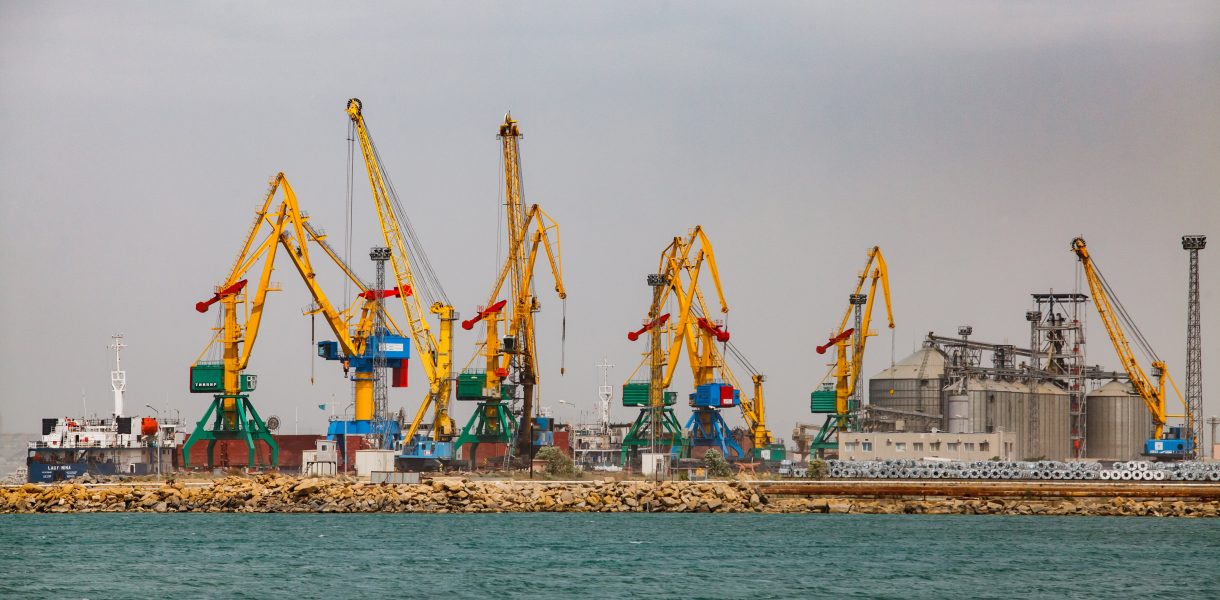The Middle Corridor, in its current design, lacks regard for its environmental and climate impacts, and for the well-being of Central Asians. It also lacks transparency, regardless of the funders’ public stance on good governance and accountability. In today’s blog, we’ll look at three elements of the Middle Corridor: insiders, corruption, and the Aktau Port Modernization project.
By Jeffrey Dunn, Crude Accountability Research Coordinator
In March 2023, the European Bank for Reconstruction and Development approved a $20 million loan to JSC National Company Aktau Sea Commercial Port for the Aktau Port Modernization project. The publicly-funded investment aims to expand and equip the Port of Aktau on the Caspian Sea in Kazakhstan, making it an integral piece of the Middle Corridor project.
A subsidiary of a Kazakhstani state-run rail company, the JSC is directly tied to a state-operated wealth fund known for its corruption scandals. The EBRD is thus investing public funds in a questionable organization for the sake of the Middle Corridor, raising questions about its commitment to transparency.
The Samruk-Kazyna Sovereign Wealth Fund
Samruk-Kazyna Sovereign Wealth Fund –worth $69 billion– is the parent company of the three state companies that handle the majority of Kazakhstan’s exports; KazMunayGas (oil and natural gas), Kazatomprom (uranium and rare metals), and Kazakhstan Temir Zholy (railways and transport)‒the latter of which is the parent company of JSC National Company Aktau Sea Commercial Port. Established in 2008 by decree of the former president, Nursultan Nazarbayev, Samruk-Kazyna served as the “key vehicle for managing state assets” in Kazakhstan. The sovereign wealth fund continues to serve as a majority, or total, shareholder for several state-owned monopolies, such as those listed above.
Insiders
Since its inception, the fund has comprised Nazarbayev family and political insiders. Nazarbayev’s sons-in-law in particular have held advantageous positions within the fund and its subsidiaries. Timur Kulibayev previously chaired the board of Samruk-Kazyna. Meanwhile, two of Nazarbayev’s other sons-in-law, Dimash Dosanov and Kairat Sharipbayev, directed two of the fund’s wealthiest assets, KazTransOil and QazaqGaz respectively.
Several assets for the sovereign wealth fund, including Temir Zholy and Kazakh Invest, still comprise insiders from the Nazarbayev period:
Nurlan Sauranbayev
Deeply involved with the Kazakh Oil and Natural gas sector since the 2000s, Sauranbayev served as Director of the Department of Engineering and Managing Director for KazMunayGas, Advisor to the Deputy Chair of the Management Board and Managing Director of Samruk-Kazyna, and Deputy Minister of Defense – all under the Nazarbayev regime.
Ulf Wokurka
Wokurka has been front and center within the Kazakhstani financial sector since 2006. A German national, Wokurka has served as CFO and Deputy Chairman of the Management Board for Samruk JSC, Head of the Representative Office of Deutsche Bank AG, Secretary of the German side of the Kazakh-German Business Council, board member and later chairman of the Kazakhstan Council of Foreign Investors, Chairman of the Management Board of Kazkommertsbank JSC, Chairman of the Management Board of Tsesnabank, on the Board of Directors of Nurbank JSC, and as independent director of KEGOC JSC, AIFC Administration JSC, and NC Kazakh Invest JSC.
Crackdown?
Following the events of January 2022, President Tokaev began to take steps to rid the Kazakhstani economy of the corruption that characterized the previous government. Samruk-Kazyna and its assets were one of the first on the chopping block, with the before-mentioned Dosanov and Sharipbayev being “purged” from their positions. Tokaev also voiced a general crackdown on the fund and its private acquisitions, including the privatization of some of its shares.
Despite this crackdown, figures such as Wokurka and Sauranbayev remain in office at the wealth fund, raising questions about the sincerity of this anti-corruption drive. More likely than not, this is simply a political stunt, designed to oust Nazarbayev loyalists and to secure Tokaev’s regime.
EBRD Policy
The policies of the EBRD stipulate transparency and a respect for human rights. However, actively funding a subsidiary of a state-owned company with historic corruption and key figures from a previous and corrupt regime is the very opposite of these commitments. While an environmental and social action plan was prepared for the project, there is no mention of corruption concerns.
Conclusion
The EBRD is investing $20 million in public funds in the development of the Aktau port, directly tied to Samruk-Kazyna. The wealth fund is known for corruption scandals under the previous government and harbors individuals who held influential positions throughout the Nazarbayev regime. The EBRD is thus investing in a questionable organization, which is known for “behind-the-scenes dealings, lack of transparency, and inflated prices,” for the sake of the Middle Corridor. While the Tokaev regime has signaled a crackdown on the wealth fund, it remains to be seen how serious this action will be, particularly if known affiliates of the former regime are still in power within the fund and its assets.

